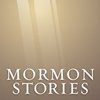Sunday in Outer Blogness: Last Gasp of 2012 Edition!!
If you had anything you wanted to be sure to do in 2012, you don’t have much time left!! It’s time for tithing settlement, and the year-end reflections have already begun! Mormons Building Bridges have been recognized as making an impact in 2012, as have many Mormon politicians who’ve been keeping the Mormon news lively throughout the year. (Like Romney, for example, who ran for president out of pure selflessness.) And now’s your chance to help pick the winners of 2012’s Brodie Awards and William Law X-Mormon of the Year!!
Christmas is mostly over, but it looks like the “War on Christmas” is wrapping up with a laugh and a poem. Here’s a Smithmas poem as well! (Is it my imagination, or did Smithmas get very little airtime this year? Maybe it needs a war on it, to drum up some interest…) Miracle on 34th Street generated some controversy, not to mention those other two Christmas stories.
This was a big year for difficult family encounters and passive-aggressive presents. (One of the people at the Swiss Post-Mo Christmas party had received one from a family member, and transformed it into a lovely/ironic ornament.) But family gatherings can also be nice — and even when they’re not, aren’t they better than nothing? And some people enjoyed alternative services and treats.
We’ve got the tail ends of a few topics still lingering on people’s tongues, such as what happened when the women wore pants. Oh, and that recent tragedy? We have some rational and irrational suggestions.
And now for this week’s new topics!! Some redditors are suggesting that City Creek Mall wasn’t a wise investment. And poor RfM — if only they weren’t so easy to make fun of! But at least they’re not as bad as those malignant Mormon memes.
Lastly, book reviews!! Post-Mormon Girl reviewed The 19th Wife (not to be confused with Wife No. 19 — though the two books are, not coincidentally, related). Sounds interesting. And Walker Wright claims that The Book of Mormon (the original JS book, not the musical) is “a good novel.” I disagree. I think the book’s lack of literary merit causes it to fail as inspired fiction in much the same way as its lack of being true/accurate causes it to fail as non-fiction. But I’m no expert, and Wright claims (with footnote):
The Book of Mormon is an epic masterpiece. At least one scholar has compared its narrative complexity to that of Tolkien’s The Lord of the Rings.
Opinions…?
Either way, Happy New Year 2013!!













































Hearing the BoM compared against the LoTR made me want to laugh – there is no comparison! As someone who has read both, I remember LoTR a lot more fondly – and it didn’t threaten to put me to sleep! (Although that may just be the memories of early morning seminary…)
@1 — I know, that’s why I had to highlight that quote! That the central text of Mormonism aspires to be on par with LoTR (and fails)…! It would be sad if it weren’t hilarious.
I realize that BOM had some emotional baggage with it… my family telling me it’s from God and believing that my lack of love for it meant I was under the influence of Satan… and that baggage makes me hate the book… but how could anyone even compare the two? One is a masterful story with good quotes and messages all throughout. The other reads like my great aunt’s journal.
Well, if you look at the footnote, the “scholar” in question is Daniel C. Peterson. Not exactly an unbiased source of Book of Mormon criticism.
@3 That’s just the thing. People develop all sorts of positive and negative emotional associations with the BoM because of their experience with treating the book as sacred and critically important. So a lot of New Order Mormons (who question the historicity of the book) argue for reading the book as fiction — because even if the book isn’t true, the NOMs feel a strong attachment to it. One of the most interesting sessions I attended at Sunstone argued just that — analyze the text without taking into account all of the baggage and trappings around it.
The problem with that approach, though, is that the text itself just isn’t that good. The role the work has played in the history of Mormonism is the only reason to treat it as important.
@4 too funny!! I didn’t even check the footnote — the quote was funny enough as it is. But if the “scholar” is DCP, that is the icing on the cake!!
To be honest, Lord of the Rings is not great literature either.
@6 Right — that’s part of what makes it so sad/funny to aspire to have the cornerstone of your religion be in the same league with it.
As the author, I thought I might clarify:
As I said in one of my comments, “The post isn’t about aesthetic taste. It is about the psychological benefits of reading the BoM as a novel. I borrow “good novel†from my dad and he said it to annoy the missionaries.” Some read it for historical evidences. Some read it by topic. Some read it for doctrine. Some, however, read it as they would a novel: cover-to-cover, chapter-by-chapter, with focus on the story and characters. This latter approach yields multiple benefits, many of which help develop the traits that Mormonism attempts to promote. To focus on the “good novel” phrase or the LotR comparison ignores the majority of the post’s content.
Nonetheless, Daniel Peterson’s article was the only published one that I could find prior to posting that made the explicit comparison. I’ve heard the comparison over the years (both positively and negatively) in personal conversations, discussion boards, and blogs. But the comparison in this case is made for complexity (e.g. cultures, geography), not aesthetic value. And I’m not sure what other word to use for a scholar of Arabic and Islam other than “scholar.” He certainly has some expertise when it comes to texts. Whatever biases he possesses (and, like everyone, he certainly does), this does not disqualify him as a scholar or earn quotations around the word.
I was surprised by the research I cited. I used to criticize people who read the BoM that way. My view has obviously been altered. I may be a literary philistine because I like both the BoM and LotR, but that isn’t the point. The point is the psychological benefits readers can reap. I hope that you at least found that interesting.
Hope that helps. Thanks for linking. Always appreciated!
@8 thanks for coming by to clarify even though my criticisms weren’t very friendly.
I’ve heard various discussions where the idea is to try to ignore all of the external baggage of how and why the Book of Mormon is famous, and just analyze the text itself, as literature.
Wasn’t that the point of your article? If it’s not, then I agree with you that I missed the point of your article.
To a degree you could say that. And that would certainly be open to criticism (good point with external baggage). Grant Hardy actually offers some helpful criticisms in the comments.
But I’m not necessarily even advocating for this approach. To me, the approach seems incomplete. But many readers (both Mormon and non) already read the book this way. They don’t “analyze the text itself, as literature.” I doubt most Mormons analyze the text much at all (certainly not in the way discussed at the Sunstone symposium you mentioned). They simply read it and enjoy the stories about the Nephites, Lamanites, and Jaredites. Their favorite characters are Samuel the Lamanite, Ammon, or Captain Moroni. Afterwards, they go and read ‘Twilight’ more-or-less the same way (probably enjoy it more, too) and root for Team Jacob or Team Edward. This simple way of reading the BoM, though, has some benefits that I thought were worth exploring. I doubt most people (Mormons or non) know or care about the various historical or literary disputes regarding the text itself.
Ultimately, stories are important. When we read stories in novels, plays, or elsewhere, we develop worthwhile traits due to our experience in the story’s simulated social world. Basically, don’t sacrifice the story of the Book of Mormon while chasing other areas of interest within it.
I was more interested in the psychological research. Perhaps the post would have benefited from tightening up the other areas. Thanks again.